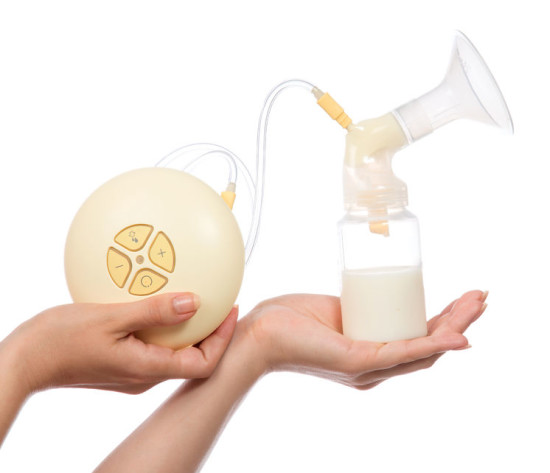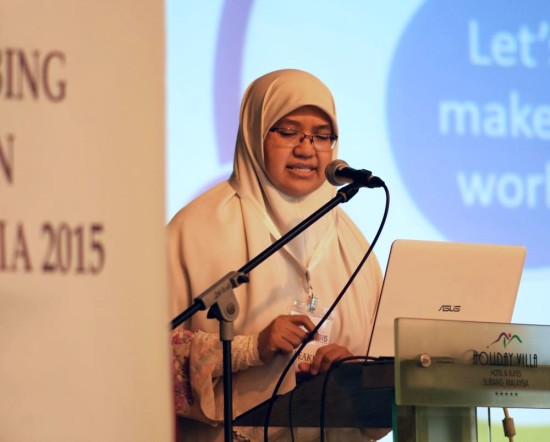
Copyright: dml5050 / 123RF Stock Photo
BALANCING work and breastfeeding can be quite tough when you don’t have ample support from family, management and colleagues.
It is important to support breastfeeding mothers at work said Dr Zaharah Sulaiman, senior lecturer and lactation consultant in Universiti Sains Malaysia, at the PRISMA 2015 conference.
Dr Zaharah was speaking on “Breastfeeding & Work: Let’s Make it Work!” at the conference, organised by the Malaysian Breastfeeding Peer Counsellor Association at Holiday Villa in Subang Jaya.
She highlighted a 2013 survey by TalentCorp and Association of Chartered Certified Accountants (ACCA), which found that 65% of women in Malaysia leave the workforce to raise a family.
According to Dr Zaharah, this is what happens when work and family are incompatible and the mother feels like she cannot cope with her work because she has other responsibilities at home.
“This leads to a compromise. Does she want to compromise her work or her family? It all depends on many factors. There are mothers who just cannot give up their work because they need the financial support. Some have the financial support, but they just love the work. So, mothers may not be able to just compromise the work.
“This work-family conflict is something that mothers struggle to fine-tune. So, it’s very important for the employers and employees to work together and help each other. When a woman breastfeeds her baby at work, she doesn’t just provide benefits for herself, but also to the employer and the company (because she is still contributing to the company),” said Dr Zaharah.

Dr Zaharah Sulaiman: ‘Those who are passionate, feel that they have control over their environment.’
According to her, the following would help breastfeeding mothers manage their time at work:
- Six months paid maternity leave;
- One or more secured breastfeeding breaks; and
- Flexible hours or job sharing.
While mothers of infants are guaranteed breastfeeding breaks at work in countries like the US, India and Indonesia, there is no such policy in Malaysia.
According to research done in the US in 2011, where 6,000 women were surveyed, the duration of maternity leave, whether it is paid or unpaid, is not important in determining how long mothers breastfeed. But, the time of return to work is very significant. If mothers can return to work later, they can breastfeed for a longer period and hence, there is a better chance that they will continue breastfeeding for a year and more.
Another thing that affects breastfeeding at work is how passionate the mothers are about it, said Dr Zaharah.
“Those who are passionate, feel that they have control over their environment. When I talk to them, they say it’s my baby, it’s my life, it’s something that is only for these two years and I have to make sure that I can do the best for my baby. When these mothers talk, I get inspired, too. They don’t really depend on others much for social support. It doesn’t matter if their work place doesn’t have a room, they will try to do something about it. And, they have many ideas to make sure they can get this done the way they want to do it,” she said.
These mothers manage to exclusively breastfeed for six months and some continue to do it for two years.
On the other extreme, there are mothers who find no difference in breastfeeding and formula feeding. They breastfeed during their maternity leave and then weaning their baby before they return to work. By the time they are back at work, their baby is being bottle fed. A lot of them have had a bad experience with breastfeeding previously.
Then there are the ambivalent mothers, or those in between these two groups.
“These mothers know the goodness of breastfeeding and know that they have to struggle with it but feel that they are under environment control, that people control them. They might feel that they are just clerks at the office and have no say.
“These mothers find breastfeeding stressful, challenging and it makes them feel guilty. This is the group that appreciates having a support system and a lactation group. This group of mothers might only breastfeed for six months but they may continue if possible.
“I’m not here to say who is the more responsible mother or who loves their infant more. I’m saying the ambivalent mothers are the ones who will benefit most from the support we are going to provide. And, if we are going to give support, we need to be more sympathetic and empathetic, and try to understand their situation. Those in the passionate group are the ones who should volunteer to offer support,” said Dr Zaharah.
She advised mothers offering support to do it in the right way. According to her, mothers feel very stressed when they see other mothers posting large quantities of their expressed breast milk on Facebook or other social media platforms.
While those posting the photos of their ample supply feel happy for being able to produce so much milk, the flip side is that it makes the ambivalent mothers frustrated.
“I’m not saying don’t post those photos, but maybe we need to find the right audience and the right time because it has a different impact,” said Dr Zaharah.
What should mothers do to help them juggle breastfeeding and work?
- Plan – Your home, your work, your breastfeeding. You can plan to do some work in advance if you know you won’t be around later. Don’t forget to have a backup plan, including where to put your milk if there is a power cut. The earlier you plan, the better.
- Seek knowledge – Not just on breastfeeding but on anything that will be help you balance your life. If you can’t manage your time, try to ask someone who is good at it to help you learn how to keep to your schedule.
- Negotiate – You will often need to negotiate at home and at work so that you have time to express your milk. This way, you get what you want and they also get what they want.
“Whatever we do, please don’t compare. If we compare and it spurs us to do better, that’s good. But sometimes we compare and it doesn’t make us better, and then it becomes a problem,” said Dr Zaharah in her parting advice to mothers.
© 2015 Thots N Tots. IMPORTANT: This article was faithfully reproduced from Thots N Tots website, with the permission of the owner. To view the original article on Thots N Tots’s website, please visit http://thotsntots.com/how-to-balance-work-and-breastfeeding/ .

Submit a comment
Your email address will not be published. Required fields are marked *
There are 0 comments